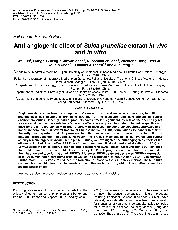摘要
Angiogenesis is a fundamental component of cancer growth and metastasis; therefore, inhibition of angiogenesis has become a promising strategy for the discovery and development of cancer chemotherapeutics. Recently, natural products have attracted significant interest as therapeutic agents for cancer since they have relatively fewer side effects as compared to modern chemotherapeutics and have long been used clinically to treat a variety of diseases, including cancer. Spica prunellae is an important component in several traditional Chinese medicine (TCM) formulations for cancer treatment. Recently, we reported that S. prunellae inhibits cancer cell growth through the induction of mitochondrion-dependent apoptosis. However, the precise mechanisms of its overall anti-cancer activity remain largely unknown. In the present study, we investigated the anti-angiogenic effects of the ethanol extract of S. prunellae (EESP) in vitro on human umbilical vein endothelial cells (HUVECs) and in vivo using the chick embryo chorioallantoic membrane (CAM) assay. We found that EESP inhibited the proliferation of HUVECs via blockade of cell cycle G1 to S progression. In addition, EESP inhibited the migration and tube formation of HUVECs. Moreover, EESP treatment decreased VEGF-A expression in HT-29 human colon carcinoma cells as well as the expression of VEGF-A and VEGFR-2 in HUVECs. Furthermore, EESP exposure reduced the formation of blood vessels in chick embryos. These results suggest that the inhibition of angiogenesis is one of the mechanisms by which S. prunellae can mediate an anti-cancer effect.
- 出版日期2011-12
- 单位福建中医药大学
